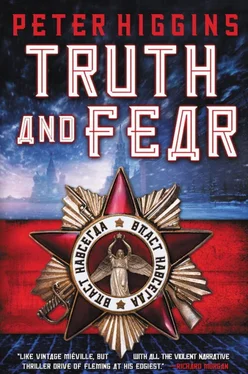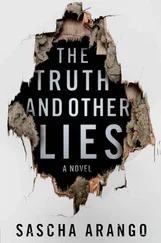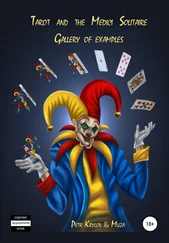‘What is it?’ said Maroussia. ‘What are you doing?’
‘I don’t know,’ said Lom. ‘Nothing. Probably nothing.’
They walked on in silence.
‘We still need to eat,’ said Lom after a while.
Maroussia shook her head.
‘I’m not hungry.’
‘Nor am I,’ said Lom. ‘All the same, we should eat when we can. Is there somewhere we could go? Somewhere quiet.’
Maroussia frowned. ‘OK,’ she said. ‘OK.’
She led them to a place in a basement, down a narrow flight of steps next to the stage door of the Mogen-Balterghen Music Theatre. There was no sign outside: if you didn’t know it was there, you’d walk right past. A shabby door opened into a kind of one-room café-bar. Maroussia had been there once, a year or so before, she said. The place was known as Billroth’s among the painters and theatricals and yellow-press journalists who spent their after-show evenings there. She hadn’t liked it much–a stale, noisy jostle, everyone shouting-drunk on cheap sweet wine–and she’d never gone back there again.
But at this time of the morning Billroth’s was just opening and almost empty: only a couple of plump-armed women in floral print blouses sharing a plate of cakes and a bottle of raspberry brandy, and a sallow ageing man with ink-black hair behind the bar, counting up the till. There was a coal fire in the grate and the smell of frying onions mixed with the reek of stale tobacco from the thick carpet and the dirty plush upholstery.
Lom found a table in the shadows away from the fire while Maroussia went across to the counter. He took off his coat and laid it beside him on the soft, sagging banquette. The brown velvet of the seat was rubbed smooth and dark. Sticky. There was thick flocked wallpaper everywhere, not on the walls only but also on the back of the doors and even the panels of the upright piano in the corner: florid blooms and intricate curlicues of dark blue against gold. It looked sticky too, with a thick patina of smoke and grease. Purple-shaded brass lamps flickered on the tables. Lom liked the place. It was cosy. To pass the time till Maroussia came back he read the yellowing show posters on the walls–THE GREEN-GOLD HYACINTH REVUE, MAIDENS ALL!, THE SCUTTLE-BUG, THE HERRING HARVEST–and studied the clutter of framed and autographed photographs among them. Studio-lit faces of actors, singers, dancers in greasepaint and costume or crisp evening wear.
One portrait in particular caught his attention. A beautiful young woman was leaning forward towards the camera, kohl-rimmed eyes wide, bright and eager, long silver-blond hair flowing from under a headdress made of birds’ wings. Her body was squeezed into a spectacular confection of feathers and fruit and flowers and bead-covered concertina sleeves, and she held some kind of stick or staff in her hand, wound round with ivy. There was a typed caption set into the mounting card: ‘AVRIL AVRILOVA as the BEREHINYA QUEEN in YOU UNDER THE LEAVES WITH ME! Produced and directed by Captain T Y Lebwohl’. There was a date, more than twenty years before, and a signature scrawled in a rounded girlish script, written big and bold across the girl’s overspilling, fruit-bedecked bosom: ‘ To Billroth. For the Friends and the Memories. Avrilova’.
Maroussia came back from the counter with a pot of coffee on a dented pewter tray. Bowls of red pork soup. A heap of apricot pastries.
‘Yesterday’s pastries,’ she said. ‘They were cheap. I don’t think they’re too stale.’
‘Good,’ said Lom. ‘Wonderful.’ He meant it. The coffee was thick and strong, and he found he was hungry again. He heaped in sugar and scooped out the cream from a couple of pastries and stirred it in. Finished the first mug in one long gulp and poured himself a second.
‘Vissarion?’ said Maroussia. ‘Why did we survive? Whoever killed those gendarmes, why didn’t they find us ?’
‘OK,’ said Lom, wiping crumbs from his mouth with the back of the hand. ‘Let’s think about it.’ In the warm fug of Billroth’s, his belly filled with coffee and pastries, what had happened was no longer an impossible irruption of uncanny violence. It was a problem to analyse. There were likelihoods to be appraised, improbabilities to be peeled away, kernels of fact to be rooted out into the light. Pragmatic decisions to be made. And he was good at that. He was trained. ‘There are three possibilities,’ he said. ‘One.’ He ticked it off on his finger. ‘The attack was unconnected to us. We just happened to be there. Whoever did it, they did what they came to do and then they left.’
Maroussia made a face.
‘You think that was nothing to do with us?’ she said. ‘You think it was a coincidence ?’
‘It’s a possibility.’
‘I don’t think so. Nor do you.’
‘OK,’ said Lom. He folded down another finger. ‘Second possibility. They were looking for us. We were the target. But they didn’t find us. So why didn’t they find us? We weren’t hard to find.’
‘They could have been disturbed,’ said Maroussia. ‘Interrupted before they finished.’
‘Disturbed by what?’ said Lom.
‘I don’t know. Anything.’
Lom shook his head.
‘I can’t see it,’ he said. ‘If they were after us, why did they fail? No reason to fail. Nothing stopping them. So…’ Another finger. ‘Third possibility. We have an ally. Or allies. The attack was meant to be help us. After all, that’s what it did. It got us out.’
‘In that case, why did they disappear?’ said Maroussia. ‘Why didn’t they stay and let us out and take us with them?’
‘Presumably so we wouldn’t see who they were,’ said Lom. ‘Our ally wants to remain anonymous.’
‘Is that what you think?’ said Maroussia.
Lom shrugged.
‘I don’t know,’ he said. ‘Coincidence? Enemy? Ally? It’s all speculation. None of this is information we can work with. All we can do is carry on. Get to Vishnik’s apartment as quickly as possible. But be more cautious. Stay away from patrols and checkpoints. Keep off trams. Walk.’
Lom paused and looked up as a tall slender man in a grey astrakhan hat came in, pulled off his hat and slumped into a deep chair next to the fire on the other side of the room. He was grey-faced and gaunt almost to the point of emaciation. He waved the barman over to give his order, then leaned back in the chair and closed his eyes. The dark shadow-rings under his eyes looked like bruises.
Maroussia picked at a stale pastry. She hadn’t touched the coffee. Lom’s rationalised anatomy of the situation hadn’t dispelled the silence in the gendarme station. The torn bodies. The smell of blood. The insistent ringing of the telephone.
‘What you said to Chazia,’ she said at last. ‘On the phone. You threatened her.’
‘Yes.’
‘You didn’t have to do that,’ said Maroussia. ‘You didn’t have to say anything at all.’
‘No.’
‘I need to find the Pollandore,’ said Maroussia. ‘That’s all I’m interested in. Nothing else.’
‘Chazia had your mother killed,’ said Lom.
‘Did she? It was Safran that shot her.’
‘On Chazia’s orders. And she’s still looking for you. Those gendarmes had your picture.’
‘But why? It makes no sense. I’m nothing. Why would Chazia even know or care that I exist?’
‘Because of the angel. Because of the Pollandore.’
Maroussia stared at him.
‘You don’t know that,’ she said.
‘No,’ said Lom. ‘But I think it. There’s a connection. Chazia. Angel. Pollandore.’
‘So you reached into the Lodka and yanked Chazia’s tail?’ she said.
‘To see what she does.’
Maroussia glared.
‘It was a spur of the moment thing,’ said Lom.
Читать дальше


![Кэмерон Доки - Правда и ее последствия[Truth and Consequences]](/books/79610/kemeron-doki-pravda-i-ee-posledstviya-truth-and-con-thumb.webp)









